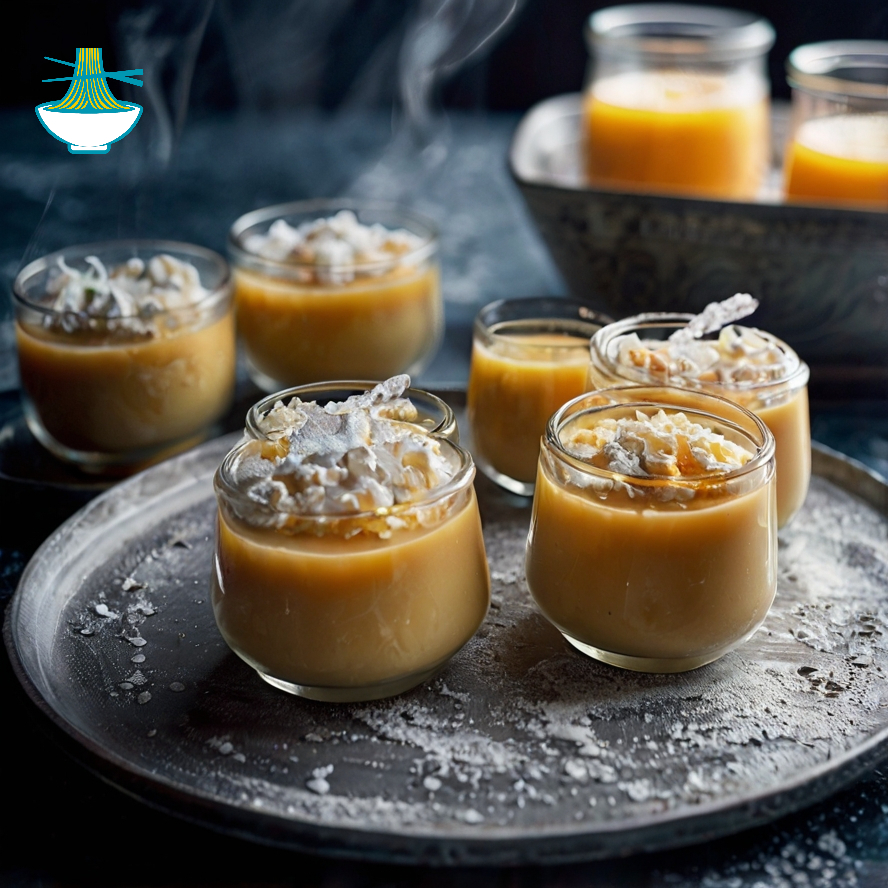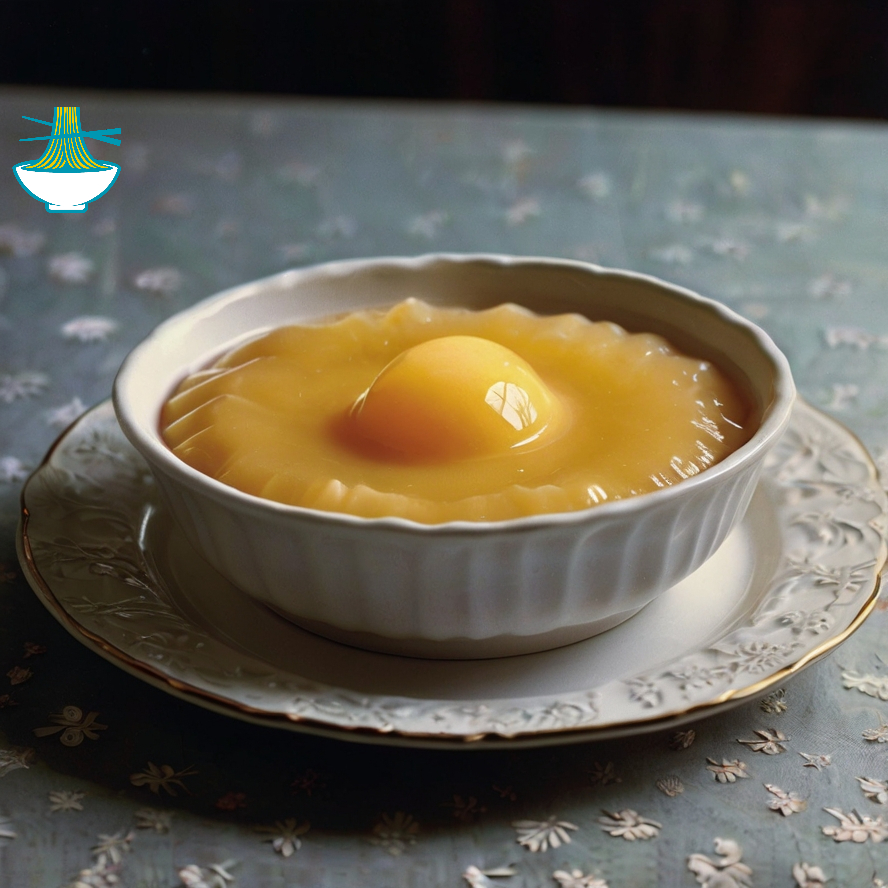Pouding chômeur, or "unemployed person's pudding," is a beloved Quebecois dessert that harks back to the Great Depression era in Canada. This comforting and straightforward treat combines basic ingredients—flour, sugar, butter, and maple syrup—into a delightful dessert that's perfect for colder months. Its unique feature is a gooey syrup layer that forms beneath a tender cake, offering a warm, indulgent experience.

Originating in Quebec during the Great Depression, Pouding chômeur became a staple among families facing economic hardship. The dessert's name reflects its humble beginnings, as it was an affordable way to make a satisfying treat with minimal resources. Despite its simplicity, Pouding chômeur has endured as a cherished part of Quebec's culinary heritage, celebrated for its nostalgic comfort and rich, sweet flavor.
Ingredients:
1. 1 1/2 cups all-purpose flour
2. 2 tsp baking powder
3. 1/4 tsp salt
4. 1/2 cup unsalted butter, softened
5. 1 cup granulated sugar
6. 2 large eggs
7. 1 cup whole milk
8. 1 cup pure maple syrup
9. 1 cup hot water
Method:
1. Preheat your oven to 350°F (175°C) and grease an 8-inch square baking dish.
2. In a medium bowl, whisk together the flour, baking powder, and salt. Set aside.
3. In a large bowl, cream the butter and sugar together until light and fluffy using an electric mixer.
4. Add the eggs one at a time, beating well after each addition.
5. Gradually add the dry ingredients to the butter mixture, alternating with the milk, until just combined.
6. Pour the batter into the prepared baking dish and smooth the top.
7. In a separate bowl, whisk together the maple syrup and hot water.
8. Pour the maple syrup mixture over the batter, covering the entire surface.
9. Bake for 40-45 minutes, or until the top is golden brown and the cake is cooked through.
10. Allow the pudding to cool slightly before serving. Enjoy warm with whipped cream or vanilla ice cream.
Notes:
- Pouding chômeur can be made in individual ramekins or a larger baking dish.
- For the best flavor, use high-quality pure maple syrup.
- Store leftovers in an airtight container in the refrigerator for up to 3 days.
This classic Quebecois dessert combines simplicity with rich flavor, making it a perfect treat for any occasion.

Nutrition Value:
1. All-Purpose Flour (1 1/2 cups)
- Calories: 684
- Carbohydrates: 142g
- Protein: 19g
- Fat: 2g
- Sodium: 3mg
- Cholesterol: 0mg
Nutritional Benefits:
- Vitamins: Small amounts of B vitamins like niacin and thiamine.
- Minerals: Contains iron and magnesium.
- Benefits: Provides energy through carbohydrates and a small amount of protein. It’s a staple in baking for structure and texture.
2. Baking Powder (2 tsp)
- Calories: 6
- Carbohydrates: 1.5g
- Protein: 0g
- Fat: 0g
- Sodium: 500mg
- Cholesterol: 0mg
Nutritional Benefits:
- Vitamins: None.
- Minerals: Contains sodium.
- Benefits: Acts as a leavening agent to make the cake rise and become fluffy.
3. Salt (1/4 tsp)
- Calories: 0
- Carbohydrates: 0g
- Protein: 0g
- Fat: 0g
- Sodium: 575mg
- Cholesterol: 0mg
Nutritional Benefits:
- Vitamins: None.
- Minerals: High in sodium.
- Benefits: Enhances flavor and balances sweetness.
4. Unsalted Butter (1/2 cup, softened)
- Calories: 810
- Carbohydrates: 0g
- Protein: 1g
- Fat: 91g
- Sodium: 2mg
- Cholesterol: 205mg
Nutritional Benefits:
- Vitamins: Good source of vitamins A, D, E, and K.
- Minerals: Contains trace amounts of calcium and phosphorus.
- Benefits: Adds richness and flavor, helps with texture and moisture in baking.
5. Granulated Sugar (1 cup)
- Calories: 774
- Carbohydrates: 200g
- Protein: 0g
- Fat: 0g
- Sodium: 1mg
- Cholesterol: 0mg
Nutritional Benefits:
- Vitamins: None.
- Minerals: Minimal.
- Benefits: Provides sweetness and energy. It’s a key component for flavor and texture.
6. Large Eggs (2)
- Calories: 140
- Carbohydrates: 1g
- Protein: 12g
- Fat: 10g
- Sodium: 140mg
- Cholesterol: 370mg
Nutritional Benefits:
- Vitamins: Rich in vitamins A, D, E, and B12.
- Minerals: Contains iron, phosphorus, and selenium.
- Benefits: Provides protein, healthy fats, and essential nutrients. Helps with binding and moisture in baking.
7. Whole Milk (1 cup)
- Calories: 150
- Carbohydrates: 12g
- Protein: 8g
- Fat: 8g
- Sodium: 98mg
- Cholesterol: 31mg
Nutritional Benefits:
- Vitamins: Good source of vitamins A, D, and B12.
- Minerals: Rich in calcium and phosphorus.
- Benefits: Adds moisture, richness, and essential nutrients like calcium and protein.
8. Pure Maple Syrup (1 cup)
- Calories: 819
- Carbohydrates: 67g
- Protein: 0g
- Fat: 0g
- Sodium: 2mg
- Cholesterol: 0mg
Nutritional Benefits:
- Vitamins: Contains small amounts of B vitamins.
- Minerals: Good source of manganese, zinc, and calcium.
- Benefits: Provides natural sweetness and unique flavor, along with some minerals and antioxidants.
9. Hot Water (1 cup)
- Calories: 0
- Carbohydrates: 0g
- Protein: 0g
- Fat: 0g
- Sodium: 0mg
- Cholesterol: 0mg
Nutritional Benefits:
- Vitamins: None.
- Minerals: None.
- Benefits: Helps dissolve the syrup and create a moist, gooey layer in the pudding.
These ingredients combine to create a dessert that offers a balance of sweetness, fat, and flavor, contributing to its comforting and indulgent nature.


Comments